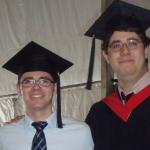Musings from Students of the Pardes Institute of Jewish Studies in Jerusalem
Posted on October 24, 2014 by David Wallach
Night Seder Chevrutas Binyamin Cohen and David Wallach join together to reflect on this week's parshah.
 אֵלֶּה, תּוֹלְדֹת נֹחַ–נֹחַ אִישׁ צַדִּיק תָּמִים הָיָה, בְּדֹרֹתָיו: אֶת-הָאֱלֹהִים, הִתְהַלֶּךְ-נֹחַ
אֵלֶּה, תּוֹלְדֹת נֹחַ–נֹחַ אִישׁ צַדִּיק תָּמִים הָיָה, בְּדֹרֹתָיו: אֶת-הָאֱלֹהִים, הִתְהַלֶּךְ-נֹחַ
(בְּרֵאשִׁית ו:ט)
These are the generations of Noah. Noah was in his generations a man righteous and whole-hearted; Noah walked with God. (Gen. 6:9)
Our parshah opens up with what seems like a very simple verse: Noah was a righteous man, who had a relationship with God. However, nearly all the classic commentators ask one very important question: if the verse wanted to convey that Noah was righteous, why not simply write
״נח איש צדיק תמים. את האלהים התהלך נח״
“Noah was a righteous and whole-hearted man; Noah walked with God.”
Why does the verse specifically mention that he was righteous in his generation?
The easy way to understand this addition is that the verse is trying to tell us that Noah was righteous only in relation to the generation in which he lived. As we will soon read, Noah’s generation was not the greatest, to say the least, and in relation to them, he was righteous. According to this reading, Noah’s character is less impressive. The line of thinking would dictate that if Noah lived in any other generation, he would not be considered righteous.
Rashi points out that this verse can actually be read in two ways. One could say that “in his generation” means that if he had lived in a generation of righteous people, he would have been even more righteous. Others could interpret it to say that in comparison with his generation he was righteous, but if he had been in Abraham’s generation, for example, he would not have been considered of any importance. The central question now becomes: was Noah truly righteous, and therefore worthy of praise? Or was he simply better than those around him, something much less impressive?
Rabbi Samson Raphael Hirsch gives us a beautiful compromise between the two opinions. Yes, Noah may have been a lesser tzaddik compared to other greats such as Avraham. Objectively (if such a measure exists), he was less righteous. However, the fact that he was able to remain righteous in such an environment of iniquity was what was impressive. With all the negative influences around him, he could have simply gone with the majority, and conformed to their ways; however, Noah knew what was right and clung to it. This is what was impressive. Not that he was greater, but rather, that he had the strength and resolution to know what was right and stick to it.
This, Rabbi Hirsch says, is what the verse means when it says that Noah walked God. Noah walked with Godly values, and knew not to turn away from them. Noah had a certain set of heavenly blinders on. No matter where he went, or what was around him, he kept looking forward and staying true to what he knew was right. Noah teaches us that if you know where you are going, if you know where you need to be, you won’t be swayed by those around you. Abraham walked before God, Noah walked with God. Avraham followed in God’s ways, but Noah never left God’s side.
This is all well and good, but the Chassidic commentaries offer a slightly more nuanced understanding of Noah that sharpens our lesson. The Chassidic tradition calls Noah a “tzaddik im pelz”, a righteous person in a fur coat. What could they possibly mean by this? They explain that, for example, when you are stuck out in the cold with others, do you put on a fur coat and only warm yourself, or do you build a fire to warm everyone? Noah chose the former. He walked with God, he walked with blinders. He built an ark to save himself. Not once did he attempt to invite anyone on, or warn them of the forthcoming destruction. Noah was righteous, but he did not reach out.
Our parshah, and the character of Noah teach us two lessons. Firstly, find what is right, know it well and cling to it. But secondly, and more importantly, if you know what is right and see the wrong in the world, do something about it! Try to change the world around you instead of walking the lonely path reserved for the righteous. Do what you can to make those around you be righteous as well. Take what you know is right, and make it a reality.
Based on Rabbi Samson Raphael Hirsch’s Torah commentary, and the Kol Menachem Chumash.